4 citations,
June 2022 in “Journal of cleaner production” New eco-friendly method strengthens and sets hair using light and causes less damage.
 4 citations,
January 2021 in “Archives of dermatological research”
4 citations,
January 2021 in “Archives of dermatological research” The study created a new model to better understand human hair growth and health.
4 citations,
January 2021 in “Cell transplantation” Scientists found the best time to transplant human stem cells for hair growth is between days 16-18 when they have the right markers and growth potential.
 4 citations,
May 2012 in “Tissue Engineering and Regenerative Medicine”
4 citations,
May 2012 in “Tissue Engineering and Regenerative Medicine” Scientists created three types of structures to help regrow hair follicles, and all showed promising results for hair regeneration.
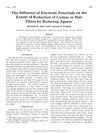 4 citations,
April 1955 in “Textile Research Journal”
4 citations,
April 1955 in “Textile Research Journal” The effectiveness of reducing agents on hair fibers depends on their electrode potentials.
3 citations,
September 2021 in “Data in brief” Bleaching hair changes its structure and weakens it, which is important for understanding hair damage and creating treatments.
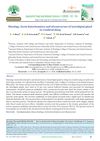 3 citations,
December 2020
3 citations,
December 2020 The interdigital gland in crossbred sheep is similar to skin and has specialized structures for secretion.
 3 citations,
December 2020 in “Scientific reports”
3 citations,
December 2020 in “Scientific reports” Mitochondrial problems in tooth cells lead to bad enamel and dentin development in mice.
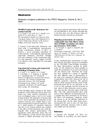 3 citations,
September 2005 in “International Journal of Cosmetic Science”
3 citations,
September 2005 in “International Journal of Cosmetic Science” Different oils penetrate hair differently; monounsaturated oils like olive oil penetrate better than polyunsaturated oils.
 1 citations,
June 2023 in “Journal of applied crystallography”
1 citations,
June 2023 in “Journal of applied crystallography” The technique showed that human hair has two main parts, with 68% being rigid and the rest flexible, and water swelling affects its structure.
 1 citations,
January 2017 in “PubMed”
1 citations,
January 2017 in “PubMed” All five hair fiber products improved appearance but didn't stick to completely bald areas.
1 citations,
November 2022 in “International journal of trichology” A girl with a rare skin condition improved after one month of treatment with acitretin.
1 citations,
July 2021 in “IntechOpen eBooks” Environmental factors can cause mutations in skin proteins, leading to skin disorders.
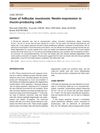 1 citations,
July 2009 in “Journal of dermatology”
1 citations,
July 2009 in “Journal of dermatology” A 29-year-old man had a jaw plaque diagnosed as follicular mucinosis, linked to nestin-positive hair follicle stem cells.
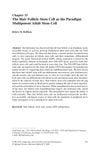 1 citations,
January 2008 in “Springer eBooks”
1 citations,
January 2008 in “Springer eBooks” Hair follicle stem cells can turn into many cell types and may help repair nerve damage and have other medical uses.
 January 2025 in “Advanced Materials Interfaces”
January 2025 in “Advanced Materials Interfaces” Tannic acid can reduce hair loss by 56.2% by coating hair and releasing beneficial molecules.
November 2024 in “Journal of Functional Foods” AP collagen peptides improve hair elasticity and gloss.
 January 2023 in “Journal of pharmacognosy and phytochemistry”
January 2023 in “Journal of pharmacognosy and phytochemistry” Herbal home remedies can effectively treat hair loss with fewer side effects.
 September 2021 in “Kazanskij medicinskij žurnal”
September 2021 in “Kazanskij medicinskij žurnal” Electrical and chemical skin stimulation can improve hair growth.
Pashmina goats produce long hair-fiber due to specific gene expressions related to hair growth.
January 2021 in “대한미용학회지” Boswellia may improve skin inflammation symptoms and positively influence hair growth in mice.
February 2020 in “Oxford University Press eBooks” The alpha-helix was confirmed as a key structure in proteins.
January 2025 in “Dermatology Online Journal” The man's hair loss and skin papules were diagnosed as atrichia with papular lesions, not alopecia areata universalis.
 November 2024 in “International Journal of Dermatology”
November 2024 in “International Journal of Dermatology” LC-OCT is a useful noninvasive tool for diagnosing and monitoring alopecia areata.
March 2024 in “International journal of molecular sciences” Three specific genetic variants cause severe skin issues in children with EBS, highlighting the need for early genetic screening.
 January 2023 in “Frontiers in bioscience”
January 2023 in “Frontiers in bioscience” Artemis protein may help control hair growth and health by influencing cell processes.
 January 2023 in “Indian dermatology online journal”
January 2023 in “Indian dermatology online journal” A boy with Pachyonychia congenita has a confirmed gene mutation, highlighting the need for a local genetic database in India.
February 2021 in “PubMed” A 2-year-old girl had a hair disorder not shared by her identical twin.
 April 2018 in “Journal of Investigative Dermatology”
April 2018 in “Journal of Investigative Dermatology” The human skin's outer layer has more variety in cell types and development paths than previously thought.
 May 2014 in “Hair transplant forum international”
May 2014 in “Hair transplant forum international” Scalp tools, tracking progress, targeting scalp inflammation, and avoiding certain hair treatments can improve female hair loss treatment.

















